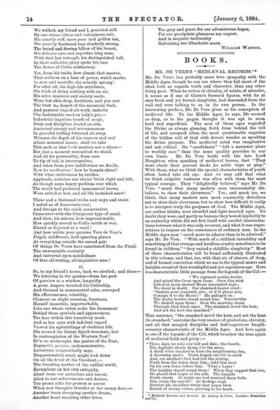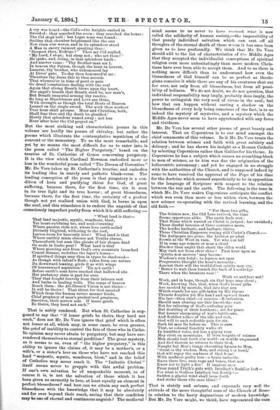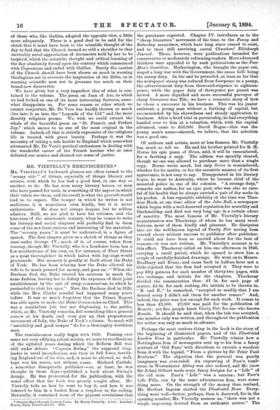BOOKS.
MR. DE VERB'S " MEDI2EVAL RECORDS."* Mn. DE MERE has probably more true sympathy with the" Middle Ages, though he can see where they fall short of the
ideal, both as regards truth and character, than any other living poet. When he writes of chivalry, of saints, of miracles,.
it seems as if one of Giotto's frescoed figures, with its at once fresh and yet formal simplicity, had descended from the wall and were talking to us in its own person. In the- interesting preface, Mr. De Vere gives us his conception of medimval life. To the Middle Ages, he says, life seemed as deep, as to the pagan thought it was apt to seem hard and superficial. The men of those ages regarded' the Divine as always glancing forth from behind the veil of life, and accepted often the most questionable auguries- of the hidden will of God with devout wonder as speaking the divine purpose. The mediaeval mind was imaginative- and not critical. Its " carefulness " "left a narrower place-
to worldly care" than the same quality provides in our own times. Mr. De Vere holds with the late Lord Houghton, when speaking of mediaeval heroes, that " They went about their gravest deeds As noble boys at play.' With them, what we think the special characteristics of youth often lasted into old age. And we may add that what. we think culpable rashness was often with them the most
typical courage. They "delightedly believed," says Mr. De Vere, " much that many modern men unreasonably dis- believe, to show their cleverness." Yes ; and much too, we think, that many modern men most reasonably disbelieve- not to show their cleverness, but to show how difficult it really is to interpret truly the purposes of God. The Middle Ages, our author thinks, were cheerful and light-hearted ages. No doubt they were, and partly so because they bowed implicitly Lo- an authority which did not fret itself with careful discrimina- tions between what it was only reverent, and what it was super- stitions to impose on the consciences of ordinary men. In the Middle Ages men " cared more to admire than to be admired," says Mr. De Vere. " With much of a childish instability and something of that strange and heedless craelty sometimes to be found in children," " they united a childlike simplicity." Most- of these characteristics will be found sufficiently illustrated in this volume, and that, too, with that air of sincere, of deep, and of formal conviction which we see in the typical saints and. knights-errant of that worshipful and yet capricious age. Here- is a characteristic little passage from the legends of the Cid :— " We captured castles twelve And raised the Cross upon them. Once dim mist Lifted at morn spewed Moors uncounted nigh ; We stood in doubt. Our standard-bearer cried : Sustain your standard, sirs ; or if it please you,
Consign it to the Moors He galloped on ; The dusky hordes closed round him. Torrent-like We dashed upon them! Soon the morning shone Through that black mass. The standard saved the host, And not the host the standard."
That sentence, "the standard saved the host, and not the host the standard," contains the very essence of symbolism, chivalry, and all that mingled discipline and half-capricious knight-
errantry characteristic of the Middle Ages. And here again is one of the legends of the Cid, which breathes the true spirit of medimval faith and piety :-
" Three days we rode o'er hill and dale; the fourth,
The daylight slowly dying o'er the moor, A shrill voice reached us from the neighbouring fen, A drowning man's. Down leaped our Cid to earth And, ere another's foot had left the stirrup, Forth from the water drew him; held him next On his own horse before him. 'Twas a Leper ! The knights stared round them! When they supped that eve, He placed that Leper at his side. The knights Forth strode. At night one bed received them both.
Sirs, learn the marvel ! As Rodrigo slept Betwixt his shoulders twain that Leper blew Breath of strong virtue, piercing to his heart.
• Media-rat Records and Sonnets. By Aubrey de 'Vera. London. Meeinillan and Co. A cry was heard—the Cid's—the knights rushed in
Sworded : they searched the room : they searched the house : The Cid slept well :*but Leper none was found : Sudden that chamber brightened like the sun New risen o'er waves, and in its splendour stood A Man in snowy raiment speaking thus : 'Steepest then, Rodrigo ? ' Thus my Cid replied, My Lord, I slept ; bat sleep not ; who art thou ? '
He spake, and, rising, in that splendour knelt : And answer came : ` Thy Brother-man am I, in heaven thy Patron, though the least in heaven, Lazarus, thy brother, who unhonoured lay At Dives' gate. To-day thou hononred'st me : 'Therefore thy Jesus this to thee accords That whensoe'er in time of peril or pain Or dread temptations dealing with the soul Again that strong Breath blows upon thy heart, or angel's breath that Breath shall be, nor man's, Mut Breath immortal arming thy resolve, So long as Humbleness and Love are thine, With strength as though the total Hosts of Heaven Leaned on thy single sword. The work thou workest That hour shall prosper. Moor and Christian, both, Shall fear thee and thy death be glorified.' Slowly that splendour waned away : not less Hour after hour the Cid prayed on."
Tut the most striking and characteristic poems in this -volume are hardly the poems of chivalry, but rather the
poems which illustrate the contemplative mysticism of the -convent or the monastery. To us the most remarkable, and yet by no means the most difficult for us to enter into, is the poem called " The Higher Purgatory," based on the 'treatise of St. Catherine of Genoa concerning purgatory.
It is the view which Cardinal Newman embodied more or Bess in the wonderful poem called "The Dream of Gerontius." Mr. De Vere takes up St. Catherine's treatise, and embodies its leading idea in stately and pathetic blank-verse. The leading conception of the poem is that purgatory is a con- dition of keen and purifying thirst for God, of great suffering, because there, for the first time, sin is seen in its true light and its true horror ; of great blessedness, because there, for the first time, the certainty of a perfect though not yet realised union with God, is borne in upon the soul, and this stimulates it to endure the anguish of that consciously imperfect purity from which it is still suffering :—
" What land is that—
That land majestic, mystic, wondrous, blest, Yet heart-subduing too, and soul-o'erawing Where passion riots not, where love earth-soiled Divinely blighted, withering to the root, Leaves room for heavenly love ? What land is that Where earthly mists obscure not Truths eterne, Thenceforth but seen like ghosts of fair shapes dead Or souls in limbo pent? What land is that Whose piercing airs from God's own mountain launched -Cancel disease, reclothes the leper's bones— If spiritual things may thus in types be shadowed— As though with infant's flesh ; takes from our nature Its downward leaning, girds it as with wings • Of heavenward aspiration ? 'Tis not earth ! Before earth's sons have reached that hallowed site .Her probatory state is past for ever.
They that fought bravely from their labours rest And bathe in healing wells. The songs of heaven Reach them: the All-Blessed Vision is not theirs— It will be theirs ! That thirst for God unsated Which from the human severs meaner kinds, Chief prophecy of man's predestined greatness, Survives, their sorrow sole. If lesser griefs Be theirs, they heed not such."
That is nobly rendered. But when St. Catherine is sup- posed to say that "if lesser griefs be theirs, they heed not such," does not Mr. De Vere ignore that grief which is often not lesser at all, which may, in some cases, be even greater, the grief -of inability to control the fate of those who in Catho- lic opinion may never attain to purgatory, but may have Bur- Tendered themselves to eternal perdition ? The great mystery, as it seems to us, even of " the higher purgatory," is this ability to ignore the claims of, it may be a mother's, or a wife's, or a sister's love on those who have not reached this land " maiestic, mystic, wondrous, blest," and in the belief of Catholics may never reach it. The " Imitatio Christi " itself seems never to grapple with this awful problem. If one's own salvation be of unspeakable moment, as of course it is, is not the salvation of those which it has been given us earnestly to love, at least equally an element in perfect blessedness ? and how can we attain any such perfect blessedness with the knowledge that it may be absolutely and for ever beyond their reach, seeing that their condition may be one of eternal and continuous anguish The mediaeval mind seems to us never to have resii.,ed what is now called the solidarity of human society,—the impossibility of that purely individual salvation which can cast off all thoughts of the eternal death of those whom it has once been given us to love profoundly. We think that Mr. De Vere should add to the list of characteristics of the Middle Ages that they accepted the individualist conceptions of spiritual religion even more unhesitatingly than more modern Chris- tians have ever been able to accept them. And to us there is nothing more difficult than to understand how even the blessedness of God himself can be so perfect as theolo- gians conceive it while there are any of his creatures shut out for ever, not only from all blessedness, but from all possi- bility of holiness. We do not doubt, we do not question, that individual responsibility may imply, probably does imply, the power to extinguish the very seed of virtue in the soul; but how that can happen without casting a shadow on the blessedness of every holy being conscious of the fact, is to us indeed the mystery of mysteries, and a mystery which the Middle Ages never seem to have apprehended with any force and vividness.
Mr. De Vere has several other poems of great beauty and interest. That on Copernicus is to our mind amongst the chief ornaments of this volume. In it Mr. De Vere treats the relation between science and faith with great subtlety and delicacy ; and he has shown his insight as a Roman Catholic by selecting Copernicus rather than Galileo for his theme. In Copernicus he has a subject which causes no stumbling-block to men of science, as to him was due the origination of the heliocentric astronomy ; and yet he engaged in no struggle with the authorities of the Church, and is supposed indeed by some to have received the approval of the Pope of his time for the doctrine which seemed superficially to be in opposition to the language of Scripture with respect to the relation between the sun and the earth. The following is the tone in which Mr. De Vere makes Copernicus anticipate the conflict which was even then more or less within view, between the new science co-operating with the revived learning, and the
old faith:— " For these two gifts, The Science new, the Old Lore revived, the time Seems opportune alike. The earth finds rest : That Rome which warred on Christ is judged ; has vanished; Those direful heresies of three centuries more, The hordes barbaric, and barbaric thrice, Those Christian Emperors vexing still Christ's Church:— The Antipopes are gone; the Arabian prophet Scowls at the West in vain. Yet who can tell If in some age remote or near a cloud Blacker than aught that shook the olden world May rush not from clear skies ? That hoar upon us • Quiets non movers' may become Wisdom's sum total ; to repress not spur Progressive thought the hour's necessity ; Against their will the truthfullest spirits may cry, ` Better to wait than launch the bark of knowledge There when the breakers roar !' Work on and fear not!
Work, and in hope, though sin that hope may cheat ; Work, knowing this, that, when God's lesser gifts Are mocked by mortals, God into that urn Which stands for aye gift-laden by His throne Thrusts deeplier yet His hand and upward draws His last—then chief—of mercies—R-tribution.
Should man abusing use this knowledge vast Not for relieving of God's suffering poor But doubling of their barthens ; not for peace But keener sharpening of war's battle-axe, And fleshlier solace of the idle and rich, God will to such redouble pain for sin.
Such lot may lie before us. This is sure That, as colossal Sanctity walks oft In humblest vales, not less a pigmy race May strut on mountains. If from heights of science Men should look forth o'er worlds on worlds unguessed And find therein no witness to their God, Naught but Man's image chaunting hymns to Man, Great is thy wisdom, Man, and strong tsy hand,' God will repay the madness of that beast With madness guilty less—a brain imbecile.
Races there live, once sage and brave, that now Know not to light a fire! If impious men
Press round Truth's gate with Intellect's fleshlier lust—For what is Godless Intellect but fleshly ?—
Sudden a glacial wind shall issue forth And strike those vile ones blind ! "
That is stately and solemn, and expounds very well the attitude of the more thoughtful sons of the Church of Rome in relation to the hasty dogmatisms of modern knowledge.
But Mr. De Vere might, we think, have represented the case
of those who, like Galileo, adopted the opposite view, a little more adequately. There is a good deal to be said for the shock that it must have been to the scientific thought of the day to find that the Church turned so cold a shoulder to that inevitably novel appreciation of documents held by her to be inspired, which the scientific thought and critical learning of the day absolutely forced upon the century which commenced with Copernicus and ended with Galileo. Surely the caution of the Church should have been shown as much in warning theologians not to overrate the inspiration of the Bible, as in warning scientific men not to presume too much on their brand-new discoveries.
We have given but a very imperfect idea of what is con- tained in the volume. The poem on Joan of Arc, to which we had looked as one of its most interesting features, some- what disappoints us. For some reason or other which we cannot conjecture, Mr. De Vere has hardly thrown so much /art, into it as into the "Legends of the Cid" and the more directly religious poems. We wish we could extract the whole of the beautiful poem on " St. Francis and Perfect Joy," which seems to us one of the most original in the volume. Indeed, all that is strictly expressive of the religious life is treated with great beauty. Perhaps it was the necessity of taking a side hostile to England which somewhat attenuated Mr. De Vere's poetical enthusiasm in dealing with the wonderful career of the French heroine who at once defeated our armies and shamed our sense of justice.












































 Previous page
Previous page